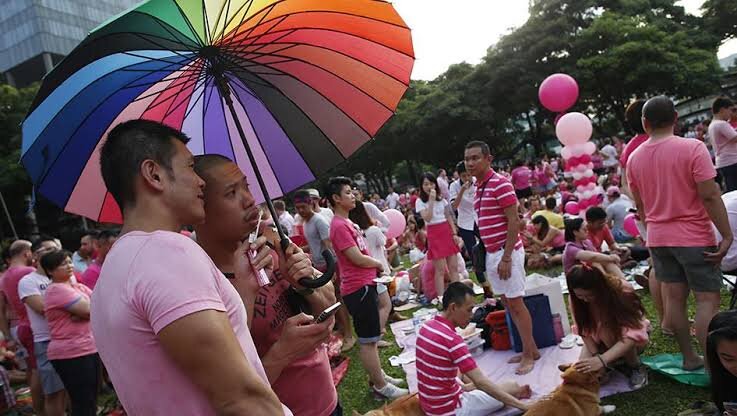Singapore has lost the battle against ‘homophobia’
The similarity of anti-homosexuality laws across the former British colonies is apparent from the code number and language of the statutes themselves. Examples include section 377 in India and section 377 & 377A in Singapore. With a view to inculcate European morality and to reform the colonies, such laws were imposed as a part of the ‘civilising mission’ of the British, the rationale being that “native” cultures failed to penalise “perverse” sex.
Two years back, Theresa May expressed her regret over Britain’s historical legacy of anti-gay laws across the Commonwealth and urged the nations to overhaul “outdated”, colonial-era legislation that treats members of LGBTQ+ as criminals. Fortunately, with the increased activism and advocacy for LGBTQ+ rights, some countries have started to reconsider abolition of Victorian era laws.
However, on 30 th March, 2020, the High Court of Singapore (“the Court”) in Ong-Ming Johnson v. Attorney General, took a regressive approach and upheld the constitutionality of section 377A, criminalising male homosexuality. In doing so, the Court reinforced colonial ideas, majoritarianism, heteronormativity, homophobia, and ignored rights of the sexual minorities.
Courts are expected to uphold fundamental rights of citizens without being guided by sanction from the majoritarian government, but in the present case, the judge held that the parliament had made a conscious decision to retain section 377A in 2007. According to the judge, the decision of the parliament indicated continued societal disapproval of male homosexual conduct.
However, the judge failed to appreciate that certain rights are so intrinsic and indispensable to the existence of human beings that they can’t be made to depend upon the majoritarian opinion. Here, the judge also fell for fallacy of ‘argumentum as populum’, i.e. an opinion or attitude is correct if it is held by majority.
The court not only gave prominence to popular view and majoritarian sentiments but also failed to consider overwhelming scientific evidence. There is conclusive evidence that a person’s sexual orientation is immutable and it is biologically determined. Medical and scientific authority have now established that consensual same sex conduct is not against the order of nature and that homosexuality is natural and a normal variant of sexuality. But the judge chose to ignore these scientific opinions and called them as ‘extralegal arguments’ which fall outside the purview of the Court.
The judge refused to acknowledge that male homosexuals have right to freedom of speech and expression under Article 14 of the Constitution of Singapore. Under this provision, the right to expression includes action, behaviour and not necessarily verbal communication. This indicates that homosexuals have a right to express their sexual identity and orientation, through speech, choice of romantic/sexual partner, expression of romantic/sexual desire, acknowledgment of relationships or any other means.
However the Court ruled that ‘freedom of expression’ is not a free-standing right and needs to be read with the right to freedom of speech i.e. the verbal communication of an idea, opinion or belief. The Judge applied the principle of ‘ejusdem generis’, meaning ‘freedom of expression’ cannot be divorced from ‘freedom of speech’.
Such an unreasonable interpretation renders the term “expression” otiose and redundant, as it would mean the same thing as “speech”. Here, the judge disregarded the fact that the parliaments don’t legislate in vain. They shun tautology, i.e. saying the same thing twice in different words. Every word in the statute has a meaning. Furthermore, the judge rejected the argument that section 377A violates Article 12(1) of the Constitution of Singapore. The provision is violative of Article 12(1) i.e. right to equality since it punishes only male homosexuals but doesn’t target females engaged in similar activities.
Lastly, the very objective of section 377A was disputed. Based on reports and legislative material, the petitioners contended that the purpose of enacting s 377A in 1938 was to target the mischief of “rampant male prostitution” and not to criminalise non-commercial, penetrative sex between male homosexuals. The ‘penetrative sexual acts’ between male homosexuals already fell within the scope of section 377, earlier repealed in 2007. The Court rejected this perfectly valid submission too.
The Court overlooked the fact that s 377A served no purpose when the homosexual acts were already covered under s 377. Former Chief Justice of Singapore has also stated that section 377A was enacted to deal with the male prostitution and its associated activities, which were rife in 1938.
This enforcement of heteronomative laws by the judge strips LGBTQ+ of human dignity, equality, privacy and liberty – the keystones of Singapore’s Constitution. We live in a world where LGBTQ+ community is still subjected to harassment, violence, stigmatisation, exclusion and prejudice because of sexual orientation. They face incessant discrimination in education, marriage, health, housing and employment. Due to non-acceptance and criminalisation, they are forced to undergo medical abuses like conversion therapy and electroshock therapy.
Sexual minority youth are three times likely to attempt suicide as heterosexual peers. But studies show that this suicide rate can be brought down significantly if gay marriages are legalised, as happened in Sweden and Denmark.
The petitioners in present case have indicated their intention to appeal against this judgment. Time will tell if the Supreme Court of Singapore will strike down section 377A and if Singapore will finally decide to break free from this colonial era law and give much awaited rights and respect to its LGBTQ+ community.
Ritika Goyal is currently pursuing an Master of Laws (LLM) in Human Rights Law at the University of Nottingham, England.
